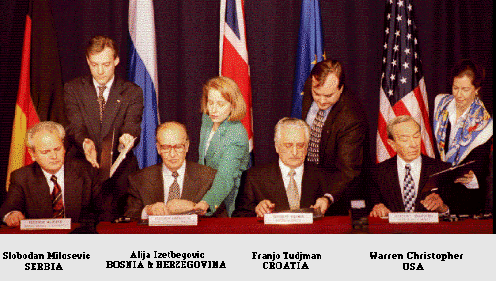
se times
22/11/2010
Dayton has kept the peace, but the country is stagnating and needed reforms face institutional obstacles. What is the next step?
By Ljiljana Kovacevic for Southeast European Times in Banja Luka –22/11/10
Dayton has kept the peace, but the country is stagnating and needed reforms face institutional obstacles. What is the next step?
By Ljiljana Kovacevic for Southeast European Times in Banja Luka –22/11/10
The Dayton Peace Accords ended the conflict in Bosnia and Herzegovina. Fifteen years after their implementation, however, the country seems to have reached another crossroads.
Efforts to overhaul the constitution and adopt reforms required by the EU and NATO have hit a wall. BiH's ethnically-divided political structure poses a formidable obstacle.
"Unfortunately, in this country nationalist agendas continue to prevail," High Representative to BiH Valentin Inzko said.
Presenting a report to the UN Security Council on November 11th, Inzko said that in the last four years, the impetus for reform has stalled, while negative rhetoric has increased.
International Crisis Group analyst Srecko Latal believes that the Dayton Peace Accords met their basic purpose of halting the BiH conflict, but did not succeed in establishing long-term political, economic and social stability.
"It is obvious that the international community, especially the EU, has to find new ways of approaching Bosnia," Latal said.
The General Framework Agreement for Peace in Bosnia -- known as the Dayton Peace Accord -- was signed on November 21st 1995, ending a three-week conference at the US military base Wright Patterson in Ohio. It officially ended four years of conflict in Bosnia.
University of Mostar sociology professor Slavo Kukic agrees that Dayton was crucial because it brought an end to the violence and helped facilitate refugee returns. But building a modern democratic society, he argues, requires something more.
"The current constitutional arrangements are not good. They are destroying the political solution adopted in Dayton," Kukic told SETimes. What is needed, he said, is a constitutional solution which ensures sufficient decentralisation and democratisation while also paving the way for a functional state.
"A prerequisite for this is to achieve political consensus, which will be difficult to come by since we have a political philosophy that is not [for the] political integration of state and society, but rather, to keep the status quo," Kukic said.
Efforts to overhaul the constitution and adopt reforms required by the EU and NATO have hit a wall. BiH's ethnically-divided political structure poses a formidable obstacle.
"Unfortunately, in this country nationalist agendas continue to prevail," High Representative to BiH Valentin Inzko said.
Presenting a report to the UN Security Council on November 11th, Inzko said that in the last four years, the impetus for reform has stalled, while negative rhetoric has increased.
International Crisis Group analyst Srecko Latal believes that the Dayton Peace Accords met their basic purpose of halting the BiH conflict, but did not succeed in establishing long-term political, economic and social stability.
"It is obvious that the international community, especially the EU, has to find new ways of approaching Bosnia," Latal said.
The General Framework Agreement for Peace in Bosnia -- known as the Dayton Peace Accord -- was signed on November 21st 1995, ending a three-week conference at the US military base Wright Patterson in Ohio. It officially ended four years of conflict in Bosnia.
University of Mostar sociology professor Slavo Kukic agrees that Dayton was crucial because it brought an end to the violence and helped facilitate refugee returns. But building a modern democratic society, he argues, requires something more.
"The current constitutional arrangements are not good. They are destroying the political solution adopted in Dayton," Kukic told SETimes. What is needed, he said, is a constitutional solution which ensures sufficient decentralisation and democratisation while also paving the way for a functional state.
"A prerequisite for this is to achieve political consensus, which will be difficult to come by since we have a political philosophy that is not [for the] political integration of state and society, but rather, to keep the status quo," Kukic said.
Political analyst Tanja Topic of Banja Luka said that since the signing of the Dayton agreement, BiH has seen many ups and downs, but in the last four years the country has stagnated.
"The biggest problem in BiH is the lack of shared vision and the fact that among the political elite there is no consensus about the past or the future of the country," Topic told SETimes.
"In this different understanding of the Dayton Agreement and the constitution in general, it appears all the views of political actors conflict on the functioning of BiH. This country can't function without the help of international factors," Topic said.
Though they were not able to resolve all problems, the Dayton Accords are the only framework available so far that can guarantee the sustainability of BiH, she said. "Any story that would mean the dismantlement of the Dayton Accords would lead to further destabilisation of the country."
This content was commissioned for SETimes.com.
"The biggest problem in BiH is the lack of shared vision and the fact that among the political elite there is no consensus about the past or the future of the country," Topic told SETimes.
"In this different understanding of the Dayton Agreement and the constitution in general, it appears all the views of political actors conflict on the functioning of BiH. This country can't function without the help of international factors," Topic said.
Though they were not able to resolve all problems, the Dayton Accords are the only framework available so far that can guarantee the sustainability of BiH, she said. "Any story that would mean the dismantlement of the Dayton Accords would lead to further destabilisation of the country."
This content was commissioned for SETimes.com.
read more: se times
Δεν υπάρχουν σχόλια:
Δημοσίευση σχολίου